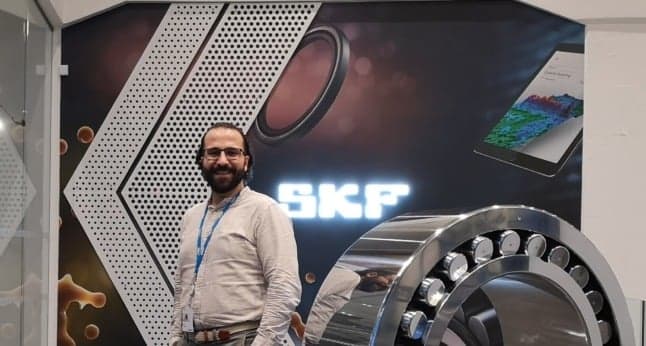‘A real eye-opener’: the Swedish university future-proofing careers
Whether you live in Sweden or elsewhere, the kind of skills you most need for tomorrow’s job market are changing. This means one more challenge to overcome for anyone living abroad or wishing to move abroad.

But some educational institutions excel in helping you to prepare for the future. That’s certainly true of Linköping University (LiU) in southern Sweden, which ranks in the worldwide top 50 for universities founded in the past 50 years.
Do you want to specialise in sustainable engineering or making sense of migration? Aircraft design or ageing populations? LiU offers 30 international programmes taught in English, covering all these fields and many more.
The Local spoke with two international graduates, now working in major Swedish companies, who took their future into their own hands through their choice of Master's studies.
Browse the full range of Master’s and degree programmes taught in English at Linköping University
An eye-opening education
“I would definitely say I’m helping to create a more sustainable future,” says Elias Hallack. “I feel sure that I’m contributing to the change in this industry – and in the world.”
Elias, who is half-Syrian and half-Brazilian, began working as an environmental analysis specialist at Swedish industrial giant SKF in September after completing a two-year Master’s in Sustainability Engineering and Management at LiU.
He uses skills he learned during his studies “on a daily basis” to gain a true picture of what’s kind to the environment and what isn’t.
“You look not only at a product’s use phase but the whole life cycle – extraction of the raw materials, transportation, production and the end of life, whether that means landfill, incineration, or recycling,” says Elias. “Learning about this was a real eye-opener for me in terms of how to think about things and see all the dimensions.”
Marcela Miranda, from Brazil, has been a sustainability specialist at Ikea for nearly three years. Like Elias, she’s concerned about climate change but feels sure she’s contributing to a positive transformation through the skills she learned during a two-year Master’s in Science for Sustainable Development.
Ikea is aiming to become a fully circular business by 2030 and Marcela analyses sustainability data and KPIs for paper suppliers. She's “putting into practice” technological skills for powerfully illustrating potential climate impacts that she learned at LiU.
“There’s a Decision Arena at the Norrköping campus, where the whole room is full of screens," Marcela explains. She says this was a priceless tool for using maps and graphs to clearly communicate the potential impact of different business choices.
 Linköping University's Decision Arena. Photo: LiU
Linköping University's Decision Arena. Photo: LiU
"I use this approach a lot in my current job," she says. "We collect our suppliers’ sustainability data and give them feedback every year, so we need [to create] nice visualisations.” This data is one of the factors taken into account in Ikea’s sourcing decisions, she adds.
Future-proof your own prospects: check out all Linköping University’s programmes in English and use this form to request further information on any programme
Comprehensive and collective
Elias and Marcela, who both came to study in Sweden with scholarships from the Swedish Institute, each say that LiU offers a comprehensive approach to the topics they care about that sets it apart.
“I chose Linköping University because the sustainable engineering programme included not only renewable energy and sustainable energy sources but also design and social aspects of sustainability,” says Elias.
Marcela, who came to Sweden from São Paulo in 2016 and completed her Master’s in 2018, says: “I looked at the course descriptions and there was a lot of really advanced technology that we don’t have in universities in Brazil.”
 Photo: Marcela Miranda and her parents at Linköping University
Photo: Marcela Miranda and her parents at Linköping University
Looking back, one more reason now stands out: “I heard from students on other Master’s that the university always emphasises critical thinking, even with something like the Sustainable Development Goals.”
This dedication to scrutinising everything in the search for solutions also inspires a collective feeling of belonging, according to Marcela: “There’s a real sense of togetherness among the students.”
Diverse paths to a future-proof career
If you’re looking to future-proof your career, focusing on sustainability is one option of many. Perhaps your interest lies in how societies should cope with ageing populations or in challenging and reimagining gender norms? There are Master’s degrees at LiU for you too.
There are also a wide range of engineering and scientific Master’s programmes, such as Biomedical Engineering, Statistics and Machine Learning, and Communications Systems (with the university at the forefront of research into 5G). You can view all 30 international programmes in this 2022 prospectus and you can use this form to get more information on any programme within an hour.
Elias, who did a bachelor’s degree in mechanical engineering in Syria, says the more relaxed style of teaching in Sweden helped him “grow in confidence” through discussions with his professors. Teaching staff also helped him submit research to a life cycle engineering conference in Belgium, where he hopes to make a presentation next year. “I believe these good relationships with my professors will also help me in the future if I ever need to ask for help,” he says.
Marcela praises the university’s CV workshops – which also encompass support with social media – for further supporting students to plan for the future.
And while she felt concerned about finding accommodation before leaving Brazil, she needn’t have worried. “As an international student, you’re really taken care of by the university and its international office,” she says. “They had everything arranged for me and also booked a taxi to pick me up at the airport. Everything was really easy, so don’t be afraid!”
Want a better future for yourself and the planet? Check out all Linköping University’s Master’s and degree programmes in English. Then find out how to apply (applications for 2022 close on January 17th)
This content was paid for by an advertiser and produced by The Local's Creative Studio.

Join the conversation in our comments section below. Share your own views and experience and if you have a question or suggestion for our journalists then email us at [email protected].
Please keep comments civil, constructive and on topic – and make sure to read our terms of use before getting involved.
Please log in here to leave a comment.